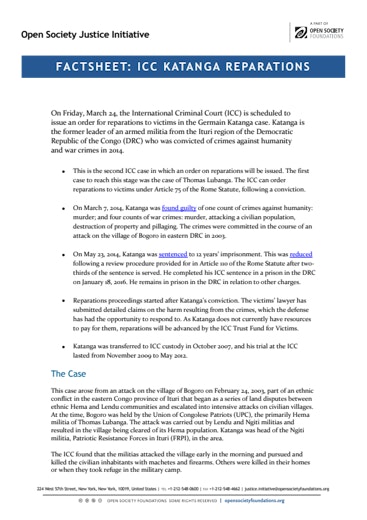ICC Katanga Reparations
On Friday March 24 the International Criminal Court (ICC) is scheduled to issue an order for reparations to victims in the Germain Katanga case. Katanga is the former leader of an armed militia from the Ituri region of the Democratic Republic of the Congo (DRC) who was convicted of crimes against humanity and war crimes in 2014.
- This is the second ICC case in which an order on reparations will be issued. The first case to reach this stage was the case of Thomas Lubanga. The ICC can order reparations to victims under Article 75 of the Rome Statute, following a conviction.
- On March 7, 2014, Katanga was found guilty of one count of crimes against humanity: murder; and four counts of war crimes: murder, attacking a civilian population, destruction of property and pillaging. The crimes were committed in the course of an attack on the village of Bogoro in eastern DRC in 2003.
- On May 23, 2014, Katanga was sentenced to 12 years’ imprisonment. This was reduced following a review procedure provided for in Article 110 of the Rome Statute after two-thirds of the sentence is served. He completed his ICC sentence in a prison in the DRC on January 18, 2016. He remains in prison in the DRC in relation to other charges.
- Reparations proceedings started after Katanga’s conviction. The victims’ lawyer has submitted detailed claims on the harm resulting from the crimes, which the defense has had the opportunity to respond to. As Katanga does not currently have resources to pay for them, reparations will be advanced by the ICC Trust Fund for Victims.
- Katanga was transferred to ICC custody in October 2007, and his trial at the ICC lasted from November 2009 to May 2012.
The Case
This case arose from an attack on the village of Bogoro on February 24, 2003, part of an ethnic conflict in the eastern Congo province of Ituri that began as a series of land disputes between ethnic Hema and Lendu communities and escalated into intensive attacks on civilian villages. At the time, Bogoro was held by the Union of Congolese Patriots (UPC), the primarily Hema militia of Thomas Lubanga. The attack was carried out by Lendu and Ngiti militias and resulted in the village being cleared of its Hema population. Katanga was head of the Ngiti militia, part of the Patriotic Resistance Forces in Ituri (FRPI), in the area.
The ICC found that the militias attacked the village early in the morning and pursued and killed the civilian inhabitants with machetes and firearms. Others were killed in their homes or when they took refuge in the military camp.
In its judgment, the trial chamber did not find enough evidence to decide that Katanga was present during the attack itself but found him guilty as an accessory, concluding he made a significant contribution to the criminal plan carried out in attacking the village. This included facilitating the supply of weapons and ammunition and providing other logistical support.
The judgment is final. No appeals against the conviction or sentence were pursued.
During the trial, 366 victims were authorized to participate following examination of claims that they were victimized as a result of the crimes Katanga was charged with. During the trial, the victims were separated into two groups: “general” victims and former child soldiers. Each group had separate legal representation because of a conflict of interests. However, Katanga was not found guilty of using children under 15 in the attack, so the group of former child soldiers is not able to claim reparations and did not take part in the reparations proceedings. Katanga was also found not guilty of the crimes of sexual violence (rape and sexual slavery) that he had been charged with.
Katanga’s case was initially joined with that against Mathieu Ngudjolo Chui, but the judges decided to separate the cases in November 2012 after the evidence had been heard, and Ngudjolo was subsequently acquitted in December 2012.
The Reparations Proceedings
ICC judges can award reparations to victims at the end of a trial following a conviction. Reparations can take different forms – the Rome Statute refers to restitution, compensation and rehabilitation - and can be individual and/or collective.
Although no case has completed the reparations phase yet, the ICC’s Appeals Chamber has already set out the approach to be followed in the case of Lubanga.
For instance, it has been established that even where a convicted person does not have assets to pay reparation – as is the case with Katanga – the court must still decide what is needed to address the harm caused by the crimes and what type of reparations he or she is responsible for. If Katanga’s circumstances change later, he will be required to pay assets he acquires towards reparations for the victims.
In the meantime, the ICC Trust Fund for Victims can, at its discretion, allocate funds for reparations programs for those victims. The Trust Fund is funded by voluntary contributions from states and others.
During the reparations proceedings, the trial chamber gave an opportunity for additional victims who had not come forward to participate during the trial to apply for reparations. It also required the victims who had already applied to supply more documentation evidencing the harm they had suffered and its monetary value. As a result, around 300 victims have presented detailed applications for reparations.
Topics
- Climate Justice
- Digital Rights and Fair Elections
- Discrimination and Racial Justice
- International Crimes
